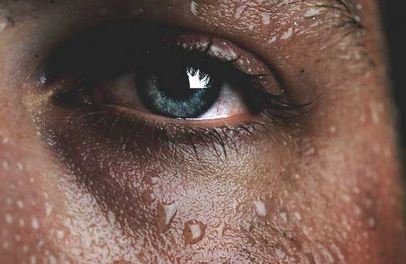Definition
We all sweat and while sweating is the body’s response mechanism to overheating, there are times when you sweat with no apparent reason, and the sweating becomes harmful. This is when it is referred to as diaphoresis.

Types
Diaphoresis involves excessive, abnormal sweating and tends to affect the entire body instead of a particular part of the body. Sometimes, it is referred to as secondary hyperhidrosis.
Primary hyperhidrosis entails profuse sweating and it is associated with a nervous system disorder. Primary hyperhidrosis tends to affect certain parts of the body such as the feet and hands. Having diaphoresis indicates an underlying health problem and at times, it can be life-threatening, requiring immediate medical treatment. Some medications may cause diaphoresis. 1,2,3,4
Sweating and Diaphoresis
The body relies on the mechanism of sweating to cool itself. When the body temperature increases, the nervous system triggers a signal that tells the sweat glands to excrete salty fluid. During the process of sweating, the sweat evaporates on the surface of the skin thus creating a cooling effect that lowered the core body temperature. It is normal for people to sweat when they exercise or during a hot day. It is the way the body controls and regulates temperature. It is also common for people to perspire when they feel stressed out or anxious. A person may also sweat when they have upset stomach or motion sickness. There are inherited trails that make a person to perspire more than other individuals. It could also be due to excess sweat glands.2
In diaphoresis, the excessive sweating is not explained by external heat and exercise3. A person with diaphoresis sweats so much such that they are soaked, and the sweating doesn’t stop as it would with normal perspiration. It continues beyond the normal sweating. People should not confuse hyperhidrosis or primary hyperhidrosis with diaphoresis because although the two are similar, they occur in different ways. Hyperhidrosis is mainly because of overactive sympathetic nervous system.1
People may use the terms ‘diaphoresis’ and ‘hyperhidrosis’ interchangeably, but it is only secondary hyperhidrosis that may be regarded as diaphoresis.5
Causes of Diaphoresis
Diaphoresis is caused by various health conditions or medications and they include:1,2,3,5,6
Hyperthyroidism
A person with hyperthyroidism releases too much thyroxine in their thyroid gland. Thyroxine is responsible for regulating the metabolism of the body. If there is too much thyroxine being released by thyroid gland, it increases the speed of metabolism leading to excessive sweating. A person having hyperthyroidism may also experience anxiety, weight loss, shaky hands, trouble sleeping, nervousness, or racing pulse.
Menopause
In women, it is common to have excessive sweating during menopause. The sweating occurs mainly at night. In the period just before and during menopause, hormones such as estrogen tend to flux or fluctuate. They may send signals to tell the brain that the body is experiencing overheating when actually it is not the case. If this happens, you may have excessive sweating occurring.
The changes and reduction in estrogen levels contribute to menopausal symptoms that include hot flashes. With hot flashes, a woman unexpectedly feels heat in their entire body and it comes along with sweating. Hot flashes begin in the areas around the face and they spread to chest. About 75 to 85 percent of women in menopause experience hot flashes and sweating. Before the hot flashes, the temperatures of the body rise and they are accompanied by an episode of awakening. 4
Pregnancy
During pregnancy many women will sweat more than other times. The sweating occurs because of hormone fluctuations, weight gain, and increased metabolism. The sweating occurring during pregnancy may be normal, however, if it occurs persistently and is accompanied by vomiting, fever, and chills, it is important a woman sees a doctor. These symptoms may indicate that there is an infection or other health problem.
Diabetes
If you have diabetes and you experience excessive sweating, it may indicate hypoglycemia meaning low blood sugar. A person having this problem needs to have the levels of blood sugar examined. Hypoglycemia may cause serious complications or even be life-threatening if no treatment is sought. Hypoglycemia may manifest with other signs such as dizziness, anxiety, loss of vision, shakiness, or slurring words.
Obesity
Obese people have extra weight that makes them to sweat profusely. The sweating may be contributed to by increased exertion occurring from carrying excess weight. It may also occur due to holding on to heat.
Medications
Various medications may have side effects that present in form of diaphoresis. Certain over-the-counter drugs and prescriptions are associated with excessive sweating and they include:
- Some antibiotics
- Antidepressants
- Pain relief medication like oxycodone
- Some antiviral drugs
- Medications used during chemotherapy
If you have excessive sweating and you are on medication, you need to talk about it with the doctor. The doctor may suggest that you have changes in your medication.
Drug and alcohol withdrawal
If a person stops the use of drugs or alcohol suddenly, they may experience withdrawal syndrome. Excessive sweating is associated with drug and alcohol withdrawal although there are other many symptoms that come with withdrawal some of which may be life-threatening. So, if you are quitting drugs and alcohol, you may need to have supervision whereby a doctor monitors the nature, severity, and occurrence of the withdrawal. Symptoms related to drug withdrawal include:
- Tremors
- Racing pulse or heart beat
- Seizures
- Vomiting
- Nausea
- Changes in blood pressure
- Anxiety
- Agitation
Cancers
Though rarely, certain cancers may make a person to perspire excessively, for example cancers of the bone, liver, blood cells (leukemia), carcinoid tumors, and lymphoma.
Anaphylaxis
When we talk of anaphylaxis, it refers to extreme allergic reaction often seen as life-threatening. A person having anaphylaxis shows other symptoms such as hives, loss of consciousness, itchy skin, sudden reduction in blood pressure, narrowing of airways or difficulty breathing. If you suspect that you have anaphylaxis, you should immediately see a doctor. Also, if someone near you has symptoms of anaphylaxis, you need to seek emergency services right away and if the person has epinephrine injector or EpiPen, you can use it to help them before the medical crew arrives.
Heart attack
Having heart attack is regarded a medical emergency. A person who has heart attack experiences severe sweating along with other symptoms such as shortness of breath, pale face, faintness, chest pain, back pain, jaw pain, arms pain (both or one arm), vomiting and nausea.
Symptoms of Diaphoresis
The main symptom that is associated with diaphoresis is excessive sweating. Because of the profuse sweating, a person may experience:5
- Increased body odor
- Dizziness
- Increased tiredness
- Cold clammy skin
- Chest pain
Diagnosis
Since many conditions cause diaphoresis, a doctor will examine the patient and conduct tests to determine the underlying cause. Differential diagnosis may be applied to exclude various conditions that may be associated with excessive sweating. The doctor conducts physical examinations and investigates the patients to rule out other diseases or conditions likely to cause diaphoresis.5
Treatment
Depending on the cause of diaphoresis, a doctor will provide appropriate treatment. In some parts of the body, especially underarms, clinical strength antiperspirants may be used to control the sweating. Botox may also be used to offer short-term relief. A doctor may use a procedure known as iontophoresis that makes use of small electrical currents to reduce sweating in parts like the feet and hands. Oral anticholinergic medications like glycopyrrolate and oxybutynin may also be prescribed.
When medications are determined to be the cause for diaphoresis, then a doctor may change the medication.
Prevention
While it is not always possible to prevent diaphoresis, there are some things an individual can do to help reduce and manage diaphoresis. For example they should:
- Manage diabetes
- Exercise regularly
- Avoid hot weather
- Drink more water
- Wear loose clothing in time of warm weather
- Maintain a healthy weight
- Eat a balanced diet, but avoid taking spicy, hot foods
- Use baking powder or absorbent powder under the arms, under the breasts, in the groin area, and on the feet
- Look for substances likely to trigger sweating and try to avoid them such as caffeine and alcohol
- Use air conditioning appliances or fans to cool down the environment
- Use clothing made of natural fibers which allow breathing for example silk, linen, and cotton.
Reference List
- What Is Diaphoresis? https://study.com/academy/lesson/diaphoresis-definition-causes-treatment.html
- Understanding Diaphoresis. https://www.healthline.com/health/diaphoresis
- Diaphoresis: What causes excessive sweating? https://www.medicalnewstoday.com/articles/321663.php
- Menopause and Sleep. https://sleepfoundation.org/sleep-topics/menopause-and-sleep
- What is Diaphoresis? Definition. https://emedicalupdates.com/diaphoresis/
- Diseases and Conditions that Can Cause https://www.sweathelp.org/pdf/Diaphoretic_Diseases.pdf#page=1&zoom=auto,-13,792
- What is diaphoresis? https://health.howstuffworks.com/wellness/men/sweating-odor/diaphoresis.htm
